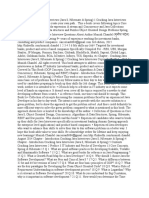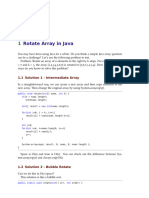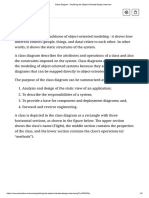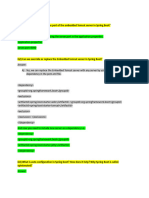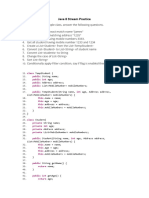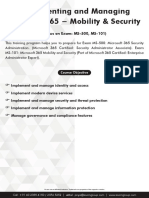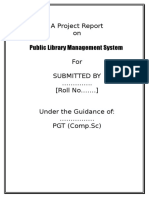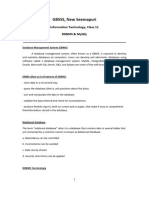45 tips to improve pragramming Information
Improving programming skills is an ongoing journey that involves continuous learning, practice, and
exploration. Here are 50 tips to help enhance your ability in programming:
1. **Start with the Basics**: Build a strong foundation by mastering the fundamentals of
programming languages, data structures, and algorithms.
2. **Practice Regularly**: Dedicate time each day to practice coding, solve problems, and work on
projects to reinforce your skills.
3. **Work on Real Projects**: Apply your knowledge to real-world projects to gain practical
experience and learn how to build complete solutions.
4. **Read Code**: Study code written by experienced programmers to learn different techniques,
patterns, and best practices.
5. **Write Clean Code**: Strive to write clean, readable, and maintainable code by following
established coding conventions and style guidelines.
6. **Learn from Mistakes**: Embrace mistakes as learning opportunities and analyze them to
understand what went wrong and how to improve.
7. **Seek Feedback**: Share your code with peers or mentors to receive constructive feedback and
suggestions for improvement.
8. **Use Version Control**: Learn to use version control systems like Git to track changes,
collaborate with others, and manage your codebase effectively.
9. **Understand Data Structures**: Gain a deep understanding of common data structures such as
arrays, linked lists, stacks, queues, trees, and graphs.
10. **Master Algorithms**: Learn various algorithms for searching, sorting, traversing, and
optimizing data to solve problems efficiently.
�11. **Practice Problem-Solving**: Solve coding challenges on platforms like LeetCode, HackerRank,
or CodeSignal to sharpen your problem-solving skills.
12. **Learn Multiple Languages**: Explore different programming languages to broaden your
perspective and understanding of programming paradigms and concepts.
13. **Explore New Technologies**: Stay updated with emerging technologies and trends in the
industry to expand your skillset and stay relevant.
14. **Contribute to Open Source**: Contribute to open-source projects on platforms like GitHub to
collaborate with others and gain exposure to real-world software development.
15. **Read Documentation**: Get into the habit of reading documentation for libraries,
frameworks, and tools to understand their features and usage.
16. **Follow Best Practices**: Learn and follow best practices for software design, development,
testing, and deployment to write high-quality code.
17. **Write Tests**: Practice writing unit tests and integration tests to ensure the correctness and
reliability of your code.
18. **Refactor Code**: Regularly refactor your code to improve its structure, readability, and
performance while reducing duplication and technical debt.
19. **Learn Design Patterns**: Study common design patterns like Singleton, Factory, Observer, and
MVC to solve recurring design problems effectively.
20. **Experiment with Projects**: Work on side projects or hobby projects to explore new
technologies, experiment with ideas, and learn by doing.
21. **Join Coding Communities**: Join online coding communities, forums, or meetups to connect
with other programmers, share knowledge, and learn from their experiences.
22. **Teach Others**: Teach programming concepts to others, such as friends, classmates, or online
learners, to reinforce your understanding and gain new perspectives.
�23. **Write Documentation**: Practice writing clear and concise documentation for your projects to
help others understand your code and its usage.
24. **Stay Organized**: Keep your codebase organized by using meaningful variable names,
modularizing code into functions or classes, and maintaining a clean folder structure.
25. **Learn Command-Line Tools**: Familiarize yourself with command-line tools and utilities to
streamline your development workflow and automate repetitive tasks.
26. **Attend Workshops and Conferences**: Attend workshops, conferences, or webinars to learn
from industry experts, network with peers, and stay updated with the latest trends.
27. **Read Books**: Read programming books, tutorials, and technical articles to gain in-depth
knowledge and insights into specific topics or technologies.
28. **Build a Portfolio**: Showcase your projects, code samples, and contributions on a personal
website or portfolio to demonstrate your skills and experience to potential employers or clients.
29. **Stay Curious**: Cultivate a curious mindset and continuously explore new topics,
technologies, and domains to keep learning and growing as a programmer.
30. **Pair Programming**: Collaborate with a partner through pair programming sessions to
exchange ideas, solve problems together, and learn from each other's strengths.
31. **Use Online Resources**: Take advantage of online resources such as tutorials, documentation,
forums, and Q&A sites to find solutions to programming challenges and learn new concepts.
32. **Follow Coding Standards**: Adhere to coding standards and style guides relevant to the
programming language or framework you're using to maintain consistency and readability across
your codebase.
33. **Experiment with Tools**: Experiment with different development tools, editors, IDEs, and
plugins to find the ones that best suit your workflow and preferences.
�34. **Set Achievable Goals**: Set specific, achievable goals for your programming journey, such as
learning a new language, completing a project, or mastering a specific skill.
35. **Stay Persistent**: Persevere through challenges and setbacks, and don't get discouraged by
failure. Keep pushing forward, and you'll gradually improve over time.
36. **Network with Professionals**: Connect with professionals in the industry through LinkedIn,
professional associations, or networking events to learn from their experiences and insights.
37. **Stay Balanced**: Balance your programming practice with other activities to avoid burnout
and maintain a healthy lifestyle. Take breaks, exercise, and pursue hobbies outside of programming.
38. **Read Source Code**: Dive into the source code of open-source projects or libraries to
understand how they're implemented and learn from the techniques used by experienced
developers.
39. **Write Code Every Day**: Make coding a daily habit by committing to writing code, even if it's
just for a few minutes each day. Consistent practice is key to improvement.
40. **Review Others' Code**: Review code written by others to learn different approaches,
techniques, and styles. Provide constructive feedback to help them improve their code as well.
41. **Join Coding Challenges**: Participate in coding competitions, hackathons, or coding challenges
to test your skills, compete with others, and solve problems under pressure.
42. **Collaborate on Projects**: Collaborate with other programmers on group projects or team-
based initiatives to learn how to work effectively in a team environment.
43. **Learn from Tutorials**: Watch programming tutorials, video lectures, or online courses to
learn new concepts, techniques, and tools from experienced instructors.
44. **Stay Patient**: Rome wasn't built in a day, and neither are programming skills. Be patient with
yourself, embrace the learning process, and celebrate your progress along the way.
45. **Stay Humble**: Recognize that there's always more to learn, and stay humble in your journey
as a programmer. Be open to feedback, willing to admit mistakes, and eager to learn from others.
�46. **Build a Support System**: Surround yourself with supportive friends, mentors, or online
communities who can encourage you, provide guidance, and help you overcome challenges.
47. **Attend Workshops and Bootcamps**: Enroll in coding workshops, bootcamps, or online
courses to receive structured instruction, hands-on practice, and feedback from experienced
instructors.
48. **Follow Industry Trends**: Stay informed about industry trends, emerging technologies, and
job market demands to align your learning goals with the skills in















